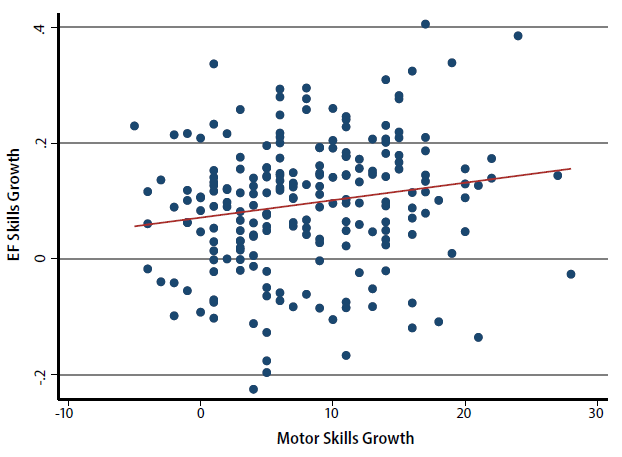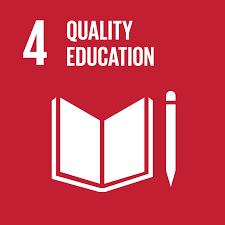Key Points
Recent findings from the Kids Activity and Learning Study complement North Carolina’s multidimensional approach to promoting school readiness by emphasizing the integrated nature of motor and cognitive development in early childhood.
A positive association between motor and EF development indicates that children whose motor skills improved the most over the course of an academic year also tended to demonstrate the biggest gains in executive function and numeracy skills.
Children who participated in adaptive, group-based motor skill activities demonstrated gains in motor competence, executive function, and numeracy skills.
Incorporating motor activities into established classroom practices has the potential to facilitate multiple aspects of children’s development and promote school readiness. Specific recommendations for early childhood educators are provided.
In 1995, the National Education Goals Panel identified a range of physical, social, emotional, language, and cognitive skills that collectively contribute to children’s school readiness (Kagan et al., 1995). These competencies were organized into five domains and are included in the early learning standards for many states, including North Carolina. Importantly, the National Education Goals Panel emphasized that early development is interdependent, so children’s progress or delays in one domain of development may influence their progress or delays in other domains. In this brief, we provide a selective overview of North Carolina’s early learning standards and highlight findings from recent empirical research that demonstrates how children’s motor skill development influences their cognitive development and early learning skills. We also consider the ways early childhood educators can use this new information in their classrooms to promote children’s overall physical, cognitive, and learning development.
North Carolina Foundations for Early Learning and Development
The North Carolina Foundations for Early Learning and Development (NC Foundations) outlines North Carolina’s early learning standards for children between birth and age five (North Carolina Foundations Task Force, 2013). The standards encompass five domains: Approaches to Play and Learning, Emotional and Social Development, Health and Physical Development, Language Development and Communication, and Cognitive Development. Each domain includes age-appropriate goals and developmental indicators. In Table 1, we selectively present a subset of exemplar goals and developmental indicators for preschool-aged children from each domain. Table 1 is intended to illustrate that North Carolina’s early learning standards encompass a comprehensive set of skills related to multiple aspects of children’s early development.
Table 1.
69813North Carolina Foundations for Early Learning and Development
A growing body of empirical research demonstrates that development across two domains of NC Foundations—(1) Health and Physical Development and (2) Approaches to Play and Learning—is interrelated (McClelland & Cameron, 2019). Specifically, recent findings indicate that improvements in children’s motor skills, an aspect of physical development, are related to improvements in their executive function (EF) skills, which contribute to how children approach learning. In the following sections, we summarize key ideas from NC Foundations and the empirical literature for each of the two domains. Next, we describe recent research that considers how these two domains are related. We conclude by considering how early educators can make use of this new information in their classrooms.
The Health and Physical Development domain of NC Foundations emphasizes that children’s participation in physically active play provides an opportunity for improving their motor development. Although efforts to increase the amount of time that children spend in moderate to vigorous physical activity are encouraged, these efforts are primarily intended to give children opportunities to develop strength, flexibility, and motor coordination. Children’s ability to coordinate increasingly complex gross and fine motor movements improves rapidly during the preschool years. Gross motor skills involve controlling large muscles to obtain balance and coordinate movement of the upper and lower body, whereas fine motor skills involve controlling small muscle movements in the hands and hand-eye coordination that requires dexterity and precision. In addition to physically active play, research consistently shows motor development occurs more rapidly when specific skills are explicitly taught and intentionally practiced through planned, developmentally appropriate movement activities (Logan et al., 2012).
The Approaches to Play and Learning domain of NC Foundations refers to children’s motivational characteristics (e.g., differences in children’s willingness and ability to persist in the face of difficulty) and general learning skills that support planning and problem solving. These Approaches to Play and Learning competencies closely resemble EF skills. EF skills are cognitive processes that support goal-directed behavior and problem solving (Garon et al., 2008). In early childhood, EF skills typically refer to working memory (i.e., the ability to hold and manipulate ideas in mind), inhibitory control (i.e., the suppression of routine behaviors), and cognitive flexibility (i.e., the ability to consider new ideas from multiple perspectives). EF skills support children’s ability to plan, monitor, and control their thoughts and actions and facilitate children’s “learning how to learn.” That is, working memory, inhibitory control, and cognitive flexibility are useful for learning new content in many different domains. Importantly, EF skills develop rapidly in early childhood, and efforts to improve EF skills through interventions may be especially effective in early childhood (Wass et al., 2012). The most-effective strategies for improving EF skills involve engaging children in authentic activities that are socially meaningful and cognitively challenging (Diamond & Ling, 2016).
The Motor-Cognition Link in Early Childhood
Developmental and educational scientists have long understood that children’s early motor skill development fosters early cognitive development. For example, the increasingly sophisticated development of motor skills in infancy and toddlerhood (e.g., sitting, reaching, walking, running) involves the integration of perceptions, intentions, and planning skills, all of which serve to organize early brain development (Adolph, 2005, 2008). Although much of the early work that linked physical to cognitive development focused on the infant and toddler periods, there is a growing awareness that motor and cognitive skills co-develop in early childhood (McClelland & Cameron, 2019). Moreover, there is evidence that children’s fine motor, gross motor, and EF skills all contribute to children’s academic achievement, behavioral competence, and emerging peer relationships in elementary school (Becker et al., 2014; Cameron et al., 2012).
In addition to evidence that motor and EF skills both contribute to important school-related outcomes, there is growing evidence that motor and EF skills are related to each other—children with better gross and fine motor skills tend to demonstrate better EF skills, including inhibitory control and working memory (Cook et al., 2019). Moreover, children’s gross and fine motor skills at the beginning of the preschool year are predictive of their behavioral competencies (i.e., self-control, cooperation) and EF skills later in the year (MacDonald et al., 2016). Although these studies suggest that efforts to improve children’s motor skills may result in corresponding improvements in children’s EF skills (both of which should benefit children’s school competencies), they do not support causal statements. Intervention studies provide a stronger test of whether efforts to improve children’s motor skills have direct benefits on EF skills and school competencies. We are aware of two recent studies, including our own study, designed to test whether motor skills interventions have corresponding benefits on children’s EF skills in preschool. In an evaluation of Successful Kinesthetic Instruction for Preschoolers (SKIP), a gross motor program targeting locomotor and object control skills, researchers reported that participating in SKIP led to greater improvements in children’s gross motor and behavioral inhibition skills than participating in typical recess activities (Mulvey et al., 2018). Although the findings reported by Mulvey and colleagues (2018) are promising, the exclusive focus on gross motor skills and the use of a motor-based assessment of EF are key limitations. We recently completed a motor skill intervention that targeted both gross and fine motor skills and examined the effects of the comprehensive program on a range of outcomes, including children’s performance on battery of computerized EF tasks and a standardized measure of early numeracy skills. In the following section, we summarize observational and experimental findings from the Kids Activity and Learning Study, a short-term longitudinal study funded by the Institute of Education Sciences.
Kids Activity and Learning Study: Observational Evidence
We recruited 283 three- to five-year-old children from 13 preschools in central North Carolina to participate in an observational study that was designed to examine whether normative developmental changes in physical activity levels and motor development were related to corresponding improvements in EF and early numeracy skills. Assessments occurred over three 1-week periods in the fall, winter, and spring of an academic year. Participating children wore an accelerometer (Actigraph wGT3x-BT) on an elastic waistband to measure their physical activity levels and completed standardized assessments of their motor (Bruininks-Oseretsky Test of Motor Proficiency 2nd Edition), EF (EF Touch), and numeracy skills (Woodcock Johnson Tests of Achievement IV – Applied Problems subtest). In general, the amount of time children spend in moderate to vigorous physical activity during the day was consistently low across the school year. In contrast, children’s motor, EF, and numeracy skills showed clear improvements. Importantly, a positive relationship was observed between motor and EF skill development, indicating that children whose motor skills improved the most between fall and spring also tended to demonstrate the biggest gains in EF and early numeracy skills (see Figure 1) (for a complete description of this work, including a detailed analytic plan, see Willoughby et al., 2021). These findings support the idea that motor skill development is an important feature of physical activity that facilitates cognitive development in early childhood.
Kids Activity and Learning Study: Experimental Evidence
To provide a stronger test of this association, we developed and implemented an 8-week gross and fine motor skills intervention that was designed to improve children’s motor skills through physically active games and activities. We combined two existing programs that individually focus on children’s gross or fine motor skills to create a comprehensive motor skills program. Activities were implemented in a small group setting and modified to be adaptive so children with varying motor abilities were continually challenged. We recruited 53 three- to five-year-old children from two preschools in central North Carolina. After completing pretest assessments of their motor, EF, and numeracy skills using the same standardized assessments identified above, children were randomly assigned to the intervention or waitlist control group. Children assigned to the intervention participated in the Kids Activity and Learning Study motor skills program for 30 minutes twice a week for 8 weeks. Each motor skill session targeted specific gross motor (e.g., locomotor, object control, stability) and fine motor (e.g., manual dexterity, visuo-motor integration) skills through game-based activities. At the end of the Kids Activity and Learning Study motor skill program, all children completed posttest assessments of their motor, EF, and numeracy skills. Children who participated in the intervention performed better than children in the waitlist control group on all outcomes (see Figure 2) (for a complete description of this work, including a detailed analytic plan, see Hudson et al., 2020). Taken together, the observational and experimental evidence from Kids Activity and Learning Study improve our confidence in recommending motor-based activities to facilitate development across several of NC Foundation’s domains, including Physical Development, Approaches to Play and Learning, and Cognitive Development (Hudson et al., 2020; Willoughby et al., 2021).
Implications for Educators
The early learning standards outlined in NC Foundations are organized across five domains and represent a commitment to promoting multiple aspects of children’s early development. We and others have begun to demonstrate that efforts to improve children’s physical development, particularly their motor skills, also have the potential to foster development across other domains of NC Foundations, including Approaches to Play and Learning (EF skills) and Cognitive Development (numeracy skills). Here, we consider three ways that early childhood educators might make use of this new information in their classrooms.
Integrate motor demands into routine classroom activities, including circle time, centers, outdoor time, and transitions. Circle time is an opportunity to introduce a “skill of the day” during whole-group instruction that can be practiced throughout the day. For example, educators could demonstrate locomotor skills such as jumping on two feet or hopping on one foot, and the class could practice jumping or hopping in place or moving forward, backward, or sideways. Opportunities to practice different styles of jumping and hopping could be offered during transitions as children wait in line. Fine motor activities that involve recreating patterns using connecting beads can be incorporated into centers to promote manual dexterity and visual motor integration.
Increase or decrease the complexity of motor activities to meet the needs of individual children with varying motor abilities, to the extent possible. Continually adapting and modifying the difficulty level of motor skills activities for individual children is essential if these motor activities are intended to support cognitive development. Motor skills activities that are either too easy or too difficult for individual children are unlikely to engage their EF skills. To accomplish this goal, educators can provide easy, standard, and hard versions of each activity. For example, a common fine motor activity involves using tracing paper to copy shapes. To decrease the difficulty of this activity, it may be helpful to decrease the complexity of the image by using basic shapes such as a triangle or square or simple letters and numbers (e.g., “L,” “V,” “7” or “4”). Another option is to increase the size of the lines to reduce the precision needed to replicate the image. To increase the difficulty, children can trace increasingly complex shapes, such as flowers or houses, or practice reproducing an image without tracing or creating the same shape but modifying the size (i.e., bigger or smaller). Similar modifications can be made during gross motor activities. For example, when practicing how to catch a ball, children may begin with a larger object, such as a beach ball, and progress over time to smaller objects, such as a tennis ball.
Emphasize fun group-based motor activities. In addition to varying the difficulty level of motor activities for individual children, another key idea is to deliver motor activities in socially meaningful activities. For example, group-based games or activities helps ensure that all children remain engaged. Encouraging children with more-advanced skills to support and assist children with less-advanced skills promotes positive peer interactions. Obstacle courses during outdoor time can reinforce multiple skills and allow children to practice completing activities as part of a team.
Summary
Early childhood educators are charged with facilitating multiple aspects of children’s development to ensure that children are physically, socially, cognitively, and academically ready for the transition to formal school. This puts tremendous pressure on early childcare programs and educators. Here, we have highlighted new research that emphasizes how efforts to enhance children’s motor skills have the potential to have unexpected benefits for children’s Approaches to Play and Learning and Cognitive outcomes. This new research is entirely consistent with ideas put forth more than 25 years ago by the National Education Goals Panel, which emphasized the interdependent nature of early development. We hope that this brief will encourage early childhood educators to consider how they can infuse motor activities into their classroom activities in ways that foster children’s physical, cognitive, academic, and potentially social development. Below, we list recommendations for supplementary reading for those who are interested in learning more about the Kids Activity and Learning Study. We also include additional resources that may support educators’ efforts to integrate motor skill activities into their classroom practices.
Additional Reading and Resources
Read about the Kids Activity and Learning Study Observational Findings (in press at Developmental Psychology)
Read about the Kids Activity and Learning Study Experimental Findings or visit https://pubmed.ncbi.nlm.nih.gov/33275832/
Go NAPSACC is an evidence-based program with training, tools, and resources to help childcare providers improve healthy eating and physical activity practices in childcare settings. For more information, visit https://gonapsacc.org/
Be Active Kids is an evidenced-based interactive health program for children from birth to five years of age that is available to adults working in childcare centers, childcare homes, and school. For more information and free resources, visit https://www.beactivekids.org/
Choosy Kids is a nationally recognized program that promotes health as a key component of school readiness and uses an active learning approach to increase physical activity. For more information and free resources, visit https://choosykids.com/





